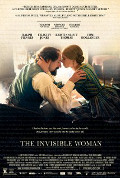
Directed by
Ralph Fiennes
111 minutes
Rated PG
Reviewed by
Sharon Hurst

The Invisible Woman
Synopsis: Margate, England, 1883, Nelly (Felicity Jones) is a mother and school-teacher who is haunted by memories of an earlier time when she was involved in a relationship with famed author and toast of London town, Charles Dickens (Ralph Fiennes).
In 1990 Claire Tomalin wrote a biography of a young actress named Ellen Ternan, the mistress of Dickens who was almost invisible to history as the writer squirreled her away from the public gaze. When Fiennes heard of the story he began working on the script with Abi Morgan, screenwriter of The Iron Lady. He was fascinated by the idea of a woman who held an entirely separate past inside her of which she is too afraid to speak and which weighed her down and that is how we meet the character at the film’s opening, a woman who seems somehow wounded and unable to move forward.
The beautiful opening shot is of a vast sweeping sea and Nelly striding agitatedly along the shore, then arriving at the school play rehearsal in which her son is performing. Distracted, her mind wanders back to 1858 when she was only 18 and part of a renowned acting family, including her two sisters and her protective mother Frances Ternan (Kristin Scott Thomas). We discover that Ellen met Dickens when her family was hired to star in a play that Dickens was directing and which was written by his friend, Wilkie Collins (Tom Hollander), himself a man with a then-improprietous Bohemian lifestyle. Ellen meets not only Dickens but also his huge family of children and seemingly stand-offish wife, Catherine (Joanna Scanlon). Despite the age gap and Dickens’ marital status, Ellen and Charles are drawn to each other.
I knew no more than the very broad strokes of the great writer’s life and so much of the film’s plot came as a great surprise to me although for some viewers they may be known. The film switches between Ellen’s present life, in which local parish pastor Rev Benham (John Kavanagh) senses her melancholy and suspects there is more to the story of the “child” who knew Dickens, and the events of earlier years in which the relationship between the pair developed.
There is much to fascinate in this film, not the least being the portrait of London’s theatrical scene of the day, and the most being the sheer vitality and love of life and fame that exudes from Dickens himself. Fiennes, ever a consummate actor, seems to simply disappear into the role of the man who is engaging and friendly to the world at large yet distant and almost heartless to his wife. As for his treatment of Ellen, judge for yourselves. Fiennes nuances his performance, ranging from romantic, to obsessional, affectionate to brusque and all things in-between. Jones, with her bee-stung lips and vulnerable expression, is perfect as the girl overcome by the notion of first love with a famous man who appears to be her soul-mate.
The look of the period is captured superbly, from the theatrical interiors, to the London streets, gracious homes, and even the race track on Derby Day and it is small wonder that film has received many nominations for awards in art direction and costume design.
Sometimes a film starts well and goes downhill. This one had me initially apprehensive, as I watched the chaos of the theatrical rehearsals, wondered about the time jumps, and got generally annoyed at Ellen’s depression. But as the plot moved along the film became progressively more involving, throwing light on all the characters in a way that made me feel for everyone in what is certainly a most dramatic, tragic, moving and intriguing episode in the lives of one hugely famous man and one virtually unheard-of woman. A bonus is that the quotes from iconic books such as Great Expectations, as discussed between Ellen and Charles, now have added resonance in the light of their sad story.

Want more about this film?


Want something different?




